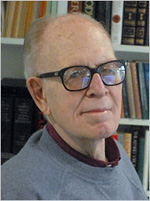Beth Ann Fennelly, “I Provide for You, Boy Child, Like God”

and like God, I will cast you out.
Your eyes blue as a drowned thing.
Your harshest lesson:
you are no part of me.Learning that
will cost you ages in whichyour eyes take on the human color: grief.
Coming to words won’t even help you
name your suffering.You will embrace
false idols.Yet those women can let you
back in that primal crawl spaceno more than I can.
From Unmentionables, Fennelly’s fourth collection, which she read from today in Alabama. You can hear Fennelly reading from “The Kudzu Chronicle,” one of the longer poems in this book, accompanied by a short animated film.
Other Fennelly poems online include “The Impossibility of Language,”Once I Did Kiss Her Wetly on the Mouth,” and “I Should Be More French. Or Japanese.“
In an essay for the Academy of American Poets, Fennelly wrote of the act of writing poetry, “What exactly is happening in our brains when we cease to become conscious of time? We are narrowing the aperture of our concentration to condense and magnify its power. We forget the daily distractions and enter into the poem so deeply that a more radical forgetting take place—the forgetting of fossilized languages that lead to writing, and thinking in, clichés.”
(Fennelly was a year behind me at Notre Dame, but I don’t think we ever really ran into each other while we were there.)
2 April 2008 | poetry |
Virgil, from The Aeneid
The commander’s words relieve their stricken hearts.
“My comrades, hardly strangers to pain before now,
we all have weathered worse. Some god will grant us
an end to this as well. You’ve threaded the rocks
resounding with Scylla’s howling rabid dogs,
and taken the brunt of the Cyclops’ boulders, too.
Call up your courage again. Dismiss your grief and fear.A joy it will be one day, perhaps, to remember even this.
Through so many hard straits, so many twists and turns
our course holds firm for Latium. There Fate holds out
a homeland, calm, at peace. There the gods decree
the kingdom of Troy will rise gain. Bear up.
Save your strength for better times to come.”
 From Robert Fagles’ 2006 translation of The Aeneid, which had been long awaited after his earlier work on The Iliad and The Odyssey. Fagles died last week; he was 74.
From Robert Fagles’ 2006 translation of The Aeneid, which had been long awaited after his earlier work on The Iliad and The Odyssey. Fagles died last week; he was 74.
Last December, many of his peers and admirers gathered in New York for a celebration of his legacy.
(photo: Laura Pedrick/NYT)
1 April 2008 | poetry |

 Our Endless and Proper Work is my new book with Belt Publishing about starting (and sticking to) a productive writing practice.
Our Endless and Proper Work is my new book with Belt Publishing about starting (and sticking to) a productive writing practice. 
